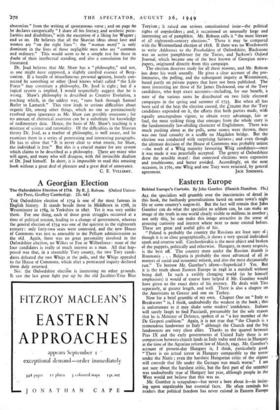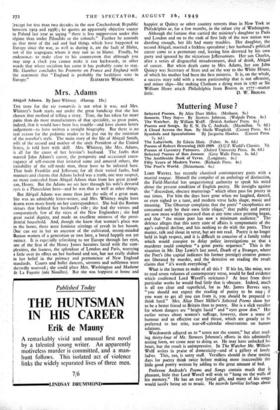Eastern Europe
Behind Europe's Curtain. By John Gunther. (Hamish Hamilton. 15s.)
ALL the specialists will grumble over the inaccuracies of detail in this book, the foolhardy generalisations based on some town's night life or some country's wagon-lit. But the fact will remain that John Gunther can do what the specialist so seldom can, he can make an image of the truth in one world clearly visible to millions in another ; not only this, he can make this image attractive in the sense of arousing curiosity and interest where next to none existed before. These are great and useful gifts of his.
"Poland is probably the country the Russians are least sure of ; though it is so close geographically, it shows a very special individual spark and creative will. Czechoslovakia is the most abject and broken of the puppets, politically and otherwise. Hungary, in many respects, is the best off. The country most under the Russian thumb is Roumania . . . Bulgaria is probably the most advanced of all in matters of social and economic reform, and also the most dictatorially run." To borrow Mr. Gunther's idiom—Superficial ? Yes. But it is the truth about Eastern Europe in 1948 in a nutshell without being dull. In such a swiftly changing world (as he himself emphasises) it would of course have helped if Mr. Gunther would have given us the exact dates of his journey. He deals with Tito separately, at greater length, and well. There is also a chapter on the Americans in Greece and one on Turkey. Now for a brief grumble of my own. Chapter One on " Italy as Breakwater " is, I think, undoubtedly the weakest in the book ; this is unfortunate as it may shake some readers' confidence. Italians will surely laugh to find Pacciardi, presumably for the sole reason that he is Minister of Defence, spoken of as " a key member of the De Gasped coalition." Again, it is not true that " the Church is a tremendous landowner in Italy " although the Church and the big landowners are very close allies. Thanks to the quarrel between Pius IX and the early governments of United Italy there is no comparison between church lands in Italy today and those in Hungary at the time of the Agrarian reform law of March, 1945. Mr. Gunther's account of present-day Hungary is, I think, particularly good. "There is no actual terror in Hungary comparable to the terror under the Nazis ; even the harshest Hungarian critic of the regime will concede that life under the Gestapo was much worse." I am not sure about the harshest critic, but the first part of the sentence was undoubtedly true of Hungary last year, although people in the West would not believe that this was so.
Mr. Gunther is scrupulous—but never a bore about it—in insist- ing upon unpalatable but essential facts. He often reminds his readers that political freedom has never existed in Eastern Europe
;except for less than two decades in the new Czechoslovak Republic between 1919 and 1938); he quotes an apparently objective source in Poland last year as saying • there is less suppression under this regime than under Pilsudski or the colonels." Further he reminds us that most of the sad and bad things which have happened to Europe since the war, as well as during it, are the fault of Hitler, not of the scapegoats whom it may suit us to blame. Finally, he endeavours to make clear to his countrymen that although you may stop a clock you cannot make it run backwards, in other words that where socialism has come it has probably come to stay. Mr. Gunther concludes his Footnote on France and England with the statement that " England is probably the healthiest state In































 Previous page
Previous page